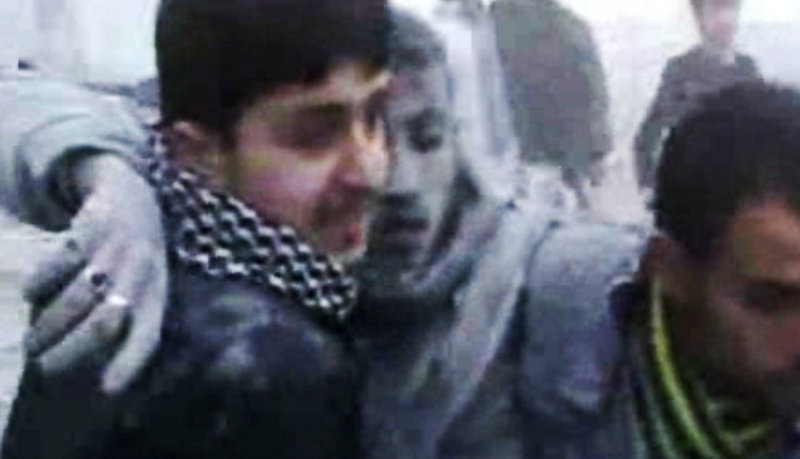BEIRUT – Twin airstrikes by government jets on a large, rebel-held suburb of Damascus on Thursday sheered the sides off apartment towers and left residents digging through rubble for the dead and wounded.
The bombing of Douma came amid a wave of attacks on rebellious districts of the Syrian capital, part of the government’s efforts to keep rebel fighters out of President Bashar Assad’s seat of power. Late Thursday, a car bomb exploded at a gas station inside the city itself, killing at least nine people, activists said.
Douma, the largest patch of rebel-held ground near Damascus, illustrates why the opposition’s advance on the capital has bogged down. Despite capturing territory and setting up committees to provide basic services, the rebels lack the firepower to challenge Assad’s forces and remain helpless before his air force.
That stalemate suggests the war will not end soon. The U.N. said Wednesday that more than 60,000 people have been killed since March 2011 — a figure much higher than previous opposition estimates.
Rebels took control of Douma, a suburb of some 200,000 located nine miles northwest of Damascus, in mid-October 2011, after launching attacks on military posts throughout the city, activists said.
Less than a week later, the rebels had taken over a half-dozen checkpoints and government buildings, said activist Mohammed Saeed. The army withdrew from others.
“Since then, the city has been totally liberated,” he said. “There are no government troops left, but we still suffer from regime airstrikes almost every day.”
Today, those entering Douma must pass through rebel checkpoints at the city’s main entryways. Rebels with camouflage vests and Kalashnikov rifles zip about on motorcycles, communicating by walkie-talkie. Some belong to the security brigade, an improvised police force to catch looters that works with a judicial council of Muslim clerics and lawyers who run a prison.
In November, residents formed a civilian council to provide services for the estimated one-third of Douma’s residents who have not fled the violence.
The council oversees committees for medical issues, bakeries, media relations and other tasks, said its head, Nizar Simadi. A former cleaner at city hall runs a cleanup crew that helps remove rubble from the streets after shell attacks and airstrikes.
The city’s electricity went out in November — activists accuse the government of cutting it in revenge — but former electric company employees have strung in power from nearby areas still on the government network, returning power to some of the city.
Douma has more than a dozen rebel brigades, and the city’s fighters have joined battles in many other areas around the capital. Most of their support comes from wealthy Syrians abroad who send money to buy arms, said the head of one rebel brigade, the Douma Martyrs, who goes by the name Abu Waleed.
In November, Douma’s fighters raided two army bases in the nearby suburb of Otaya, he said, making off with arms that helped them push closer to Damascus. But they can do little about the government’s airstrikes. Rebel forces are currently fighting the government in areas on three sides of the capital.
Send questions/comments to the editors.



Success. Please wait for the page to reload. If the page does not reload within 5 seconds, please refresh the page.
Enter your email and password to access comments.
Hi, to comment on stories you must . This profile is in addition to your subscription and website login.
Already have a commenting profile? .
Invalid username/password.
Please check your email to confirm and complete your registration.
Only subscribers are eligible to post comments. Please subscribe or login first for digital access. Here’s why.
Use the form below to reset your password. When you've submitted your account email, we will send an email with a reset code.